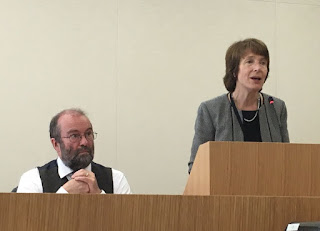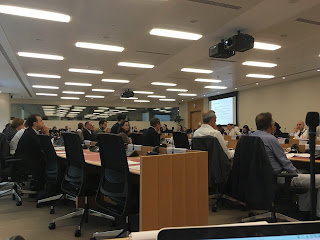 |
| EACPT Executive Committee meeting in Stockholm |
The EACPT Executive Committee is meeting in early April 2018 in
Stockholm to plan for future activities.
Key matters for discussion include
1. Future EACPT Congresses - the next is due to be held in 2019 in Stockholm as
a partnership between the EACPT and the Swedish Society for Pharmacology,
Clinical Pharmacology and Therapeutics. The Congress will address Tomorrow's
Healthcare Challenges and will be held at the City Conference Centre - 5
minutes from Stockholm Central Station.
2. The next EACPT Focus meeting: Innovations in CPT Education - to be held at the University of Birmingham 7-8 September 2018.
3. New EACPT Awards for Best Scientific Paper in the previous 12 months. These awards will be launched on 1st June 2018 and awarded initially every 2 months (6 times a year) from August 2018. Award winners will receive a free one year Individual Associate Membership (IAM) of the EACPT. Winners who are already EACPT IAMs will receive a 100€ prize. Papers which receive a EACPT Scientific Paper Award will be eligible to be considered for the biennial EACPT Scientific Award.
4. EACPT working groups on Education, Research, Young Professionals, and Regulation and Ethics.
5. New EACPT web series on Meet the Clinical Pharmacologists
6. Opportunities from links with international organisations such as the European Medicines Agency, IUPHAR, EPHAR and UEM
7. Opportunities for Individual Associate Members including:
* discounted registration fees for EACPT meetings
* online access to the official EACPT Journal - Clinical Therapeutics
* networking with colleagues worldwide through the global EACPT network of Associate Members
* active involvement in EACPT Working Parties and other activities
2. The next EACPT Focus meeting: Innovations in CPT Education - to be held at the University of Birmingham 7-8 September 2018.
3. New EACPT Awards for Best Scientific Paper in the previous 12 months. These awards will be launched on 1st June 2018 and awarded initially every 2 months (6 times a year) from August 2018. Award winners will receive a free one year Individual Associate Membership (IAM) of the EACPT. Winners who are already EACPT IAMs will receive a 100€ prize. Papers which receive a EACPT Scientific Paper Award will be eligible to be considered for the biennial EACPT Scientific Award.
4. EACPT working groups on Education, Research, Young Professionals, and Regulation and Ethics.
5. New EACPT web series on Meet the Clinical Pharmacologists
6. Opportunities from links with international organisations such as the European Medicines Agency, IUPHAR, EPHAR and UEM
7. Opportunities for Individual Associate Members including:
* discounted registration fees for EACPT meetings
* online access to the official EACPT Journal - Clinical Therapeutics
* networking with colleagues worldwide through the global EACPT network of Associate Members
* active involvement in EACPT Working Parties and other activities
The EACPT Executive Committee meets 6 monthly, with regular additional
discussions by teleconference on key EACPT strategy and activities.
Future EACPT Congresses will be held in:
- 2019 Stockholm
- 2021 Athens
- 2023 Rotterdam
The EACPT was founded in 1993 - 25 years ago - and now includes as members all national organisations for clinical pharmacology in Europe, as well as organisations from further afield internationally. The EACPT aims to provide educational and scientific support for the more than 4000 individual professionals interested in clinical pharmacology and therapeutics throughout the European region, with its congresses attended by a global audience. The EACPT also advises policy makers on how the specialty can contribute to human health and wealth.
- 2019 Stockholm
- 2021 Athens
- 2023 Rotterdam
The EACPT was founded in 1993 - 25 years ago - and now includes as members all national organisations for clinical pharmacology in Europe, as well as organisations from further afield internationally. The EACPT aims to provide educational and scientific support for the more than 4000 individual professionals interested in clinical pharmacology and therapeutics throughout the European region, with its congresses attended by a global audience. The EACPT also advises policy makers on how the specialty can contribute to human health and wealth.

